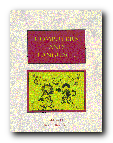essays on computers, teaching, and writing
What has been the impact of the PC in the classroom? Computers and Language is collection of essays presenting the results of studies monitoring research on the subject, and it offers one or two extended position papers and guides to software. John Pratt for instance explores the commonly observed phenomenon that students tend to be less inhibited in exploring writing programmes than their tutors – a point reinforced by other contributions. Maybe the next generation will have a different attitude to composition if they have grown up in front of a screen rather than a note book?
 Chris Breeze argues in a letter to his headmaster that working on a PC encourages children to re-draft their work. Most teachers of writing would probably agree that this is something to be encouraged. It is interesting to observe however that one or two of the articles start out as a celebration of the PC as a liberating tool for students, but then gradually reveal the author’s wish to control production. Teachers rule – OK?
Chris Breeze argues in a letter to his headmaster that working on a PC encourages children to re-draft their work. Most teachers of writing would probably agree that this is something to be encouraged. It is interesting to observe however that one or two of the articles start out as a celebration of the PC as a liberating tool for students, but then gradually reveal the author’s wish to control production. Teachers rule – OK?
There are a couple of [obligatory?] chapters dealing with Hypertext as an adjunct to constructing narratives. Stephen Marcus inspects the use of Hypertext programmes [GUIDE, HYPERCARD] and makes what in the hands of school-age children might be rather ambitious claims for them. If the debates currently raging in the alt.hypertext newsgroup are anything to go by, this is still a contentious issue. There is as yet no fictional hypertext which has staked a claim for aesthetic distinction – but its defendants point out that no other medium produced a masterpiece at first outing.
The most engaging and informative contribution is from Noel Williams – a straightforward review of the software available to assist authors in the post-writing phase. He examines programmes such as GRAMMATIK (then still in version IV) WRITER’S WORKBENCH, and CORPORATE VOICE. In the end he comes down heavily in favour of Ruskin. Like most other commentators on this type of spell- and grammar-checking software, he suggests that people should not be intimidated by rule-governed programmes, encouraging us to “ignor[re] those parts of the system which do not match … writer’s needs”.
One of the main problems with articles and publications of this nature is that they are now rapidly superseded by software updates and discussion which takes place more immediately on the Internet. Nevertheless, there is probably good reason for a place for this collection in the departmental library.
© Roy Johnson 2001
Moira Monteith (ed), Computers and Language, Oxford: Intellect, 1993, pp.159, ISBN: 1871516277